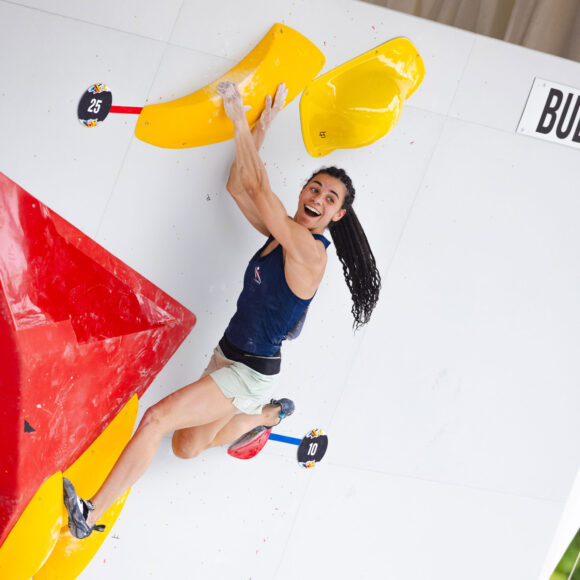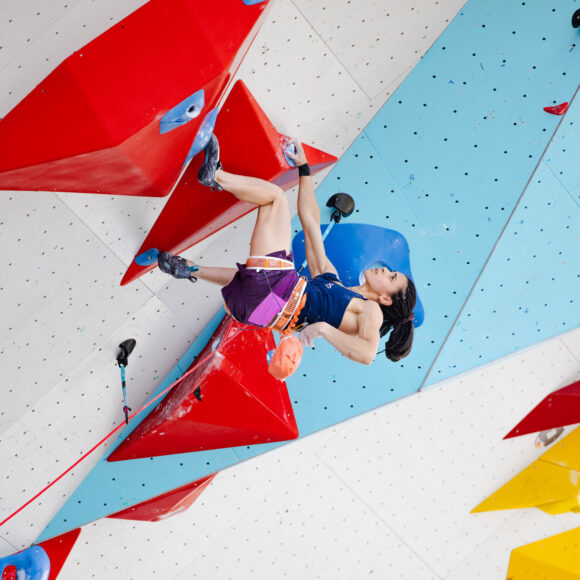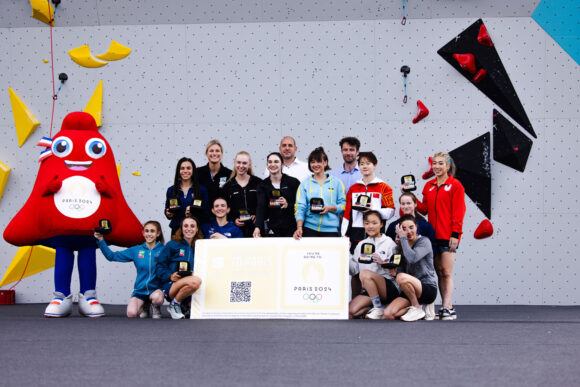
Growing up, a young girl from London was allowed to choose an activity to celebrate her birthday each year, and armed with a passion for trying new sports, so when Depot Climbing athlete Molly Thompson-Smith turned 7, she chose to try climbing for the first time. And that’s when everything changed.
Fast forward the best part of 20 years later, the eager 7-year-old who just loved trying new sports is about to head to the Olympic Games in Paris.
A lot about her climbing has changed, but the thing that remains is a passion and enjoyment for movement that, as many of us know, can be quite addictive!
As the dust settles on the final round of the Olympic Qualification Series, we caught up with Olympian Molly Thompson-Smith to find out a little bit more about what it feels like to qualify for the biggest sporting event in the world.
Read Molly Joins Depot Climbing Read Erin McNeice Qualifies for Paris
So, Molly Thompson-Smith, the Olympian. How does that feel?
Still pretty unreal to be honest, and I’m not sure it will sink in until I’m actually in the village in Paris in August! But I hope that it will sink in soon and i’m able to fully absorb all of the experiences that are to come 🙂
At what age did you first think ‘I want to compete at an Olympic games?
It’s been a dream for a very long time! I remember being glued to my parents TV during the summer to watch the Olympics and just feeling so inspired by all of the athletes representing TeamGB, and loving how it felt like the whole World was on pause – all willing their athletes on but being united by this common feeling of inspiration.
I totally wanted to be there on TV screens with tonnes of families across the UK screaming at their telly for me! I had no idea which sport I would be doing, but I knew that was where I wanted to be one day.
The Olympic Qualifying Series was a new format of qualification cycle, how did that look and did it affect on your usual competition season?
It really messed with the competition schedule in terms of tactics and planning, but also in the way that most athletes viewed the World Cups. As a large proportion of the field was prioritising Olympic qualification, the first World Cups felt like ‘warm-ups’ and ‘testers’ for the ‘real thing’.
Having been competing for quite a while now and coming from an era where the overall World Cup champion was the coolest person in the sport, I’ll be honest and say that I really didn’t like this about climbing featuring in the Olympics.
It seemed a shame for people to skip World Cups and not take them as seriously as they used to as younger athletes. But I totally get it, and the Olympics don’t come around every year!

Find out more about Molly in our People of Depot Climbing video series

For those who may not be familiar with competing, how did qualifying for the Olympics via Olympic Qualifying Series look as a participant?
It was cool to be surrounded by lots of other athletes from 3 other sports (breaking, BMX & skateboarding) and be a part of a big multi-sports event. The climbing competition itself was largely the same, just with a different format and higher stakes!
And of course, the Olympic Qualifying Series was the last stop before Paris so the turnaround has been very quick, and it’s back to training after a quick week to celebrate with friends and family.
The OQS took place over two rounds, in Shanghai and Budapest. If there were any, what were the differences between competing at the two events? (I.e. Budapest had friends and family there?)
Budapest was much more enjoyable for me as I was able to have my partner Sam and my parents out to support me, and with it being almost the same time zone as home a lot more people were able to watch live so it felt like we had a lot of support behind us!
A few members of the Precision Climbing squad even flew out to support the team, which was a lovely surprise and hearing those familiar voices gave me a little more fire on the mats.
The events were both challenging weather-wise, seeing temperatures over 30 degrees, but Budapest had to be one of the hottest events I’ve ever competed in and managing that made the event feel more difficult than Shanghai.
Of course, Budapest also revealed who would get the Olympic tickets, so the atmosphere was definitely more tense with a lot to play for!
When did training for the Olympics in Paris start in earnest?
It was always the goal, and on my mind as soon as I didn’t qualify for Tokyo.
But when I broke my ankle in September 2022, it seemed like the obvious comeback motivation. I guess I was training for it even before Tokyo as much as I love bouldering, my heart definitely belongs to lead and I probably wouldn’t train to compete in bouldering internationals if it wasn’t for the Olympics!
The format of the Olympic combined has changed a lot over the years, and so after the 2023 season when I’d qualified for Olympic Qualification Series and had a clearer picture of what it looked like, I was completely dedicated to training specifically for Paris.
The theme of the Paris Olympics is ‘Let’s Move and Celebrate’, to inspire people worldwide to take part in daily exercise. What would be your top tip for someone looking to make daily changes to their activity levels?
Be realistic with what you can add to your life; as enticing as it is to have grand goals, if they don’t fit with your lifestyles and routines then you’re less likely to manage them, and may have negative feelings when this is the case.
Get some friends on board and choose activities you can do together – this will mean you’re accountable to someone else and more likely to do it, and doing things with friends is always fun!
Having the Olympics so close to home in Paris, does it have more of a special feeling attached as it’s (almost) home turf?
Definitely! My parents live in London and from theirs, it probably only takes 3 hours to get to the arena from their house which is very cool! The Games being in Paris means coming to support is much more accessible to the people I care about at home, and it’ll mean a lot to have their support there.
Climbing at the Olympic Games starts on August 5th, what does your preparation look like? It’s a quick turnaround from qualification to competing.
With such a short turnaround the priority will be on feeling good and psyched going into Paris. I’ll try and top up my route endurance and work on some key bouldering skills, but I’m also going to enjoy the experience!


What will your support team in Paris look like?
I’m not entirely sure what the coaching support team will look like yet, but my partner Sam will be out as an accredited photographer, and my parents and school friends will be over in Paris to cheer me on! And my coach Ellie Glennie will be behind me wherever and whenever she can 🙂
You’ve been competing and representing Great Britain in climbing for a decade(?), does it feel different to represent Team GB at the Olympics compared to a World Cup?
I genuinely have no idea how it’ll feel to represent TeamGB at the Olympics, but I imagine it’ll be an amazing experience to be part of a huge team of athletes and be surrounded by others who completely understand all of the sacrifices, doubts, joys and passion that goes into what we do!
What do you think your lasting Olympic legacy might be? (E.g. Are you hoping to inspire a new generation of climbers / add to GB’s medal count/change perceptions etc.)
I’m hoping to inspire a new audience to consider climbing as a sport they might be interested in as I think there is still a lot of improvement to be made in how diverse the climbing community is.
I hope that my presence on the Olympic stage will show that it can be a sport for people outside of the stereotypical idea of what a climber looks like, and hopefully encourage people from underrepresented backgrounds in our sport to give it a go and see if it’s for them!
I’m also hoping to prove that injuries and obstacles may be challenging but don’t have to be the end to your goals and dreams! I’ve had my fair share of injuries on this road to Paris and as difficult as they made this journey, they taught me a lot and showed me how resilient I am.
I’m hoping people will see that with hard work, belief, and a good support network around you, we’re all much stronger than we think!
You’ve had a few ups and downs with injuries during your career, what advice would you give to a climber dealing with the challenges of injury?
Surround yourself with people who will remind you why you love climbing, and also listen to you on the days when it’s hard. Have mini goals so that you’re able to recognise, and celebrate progress in your recovery.
These things will make the process more enjoyable too!
How do you train your mental resilience alongside your climbing techniques?
I don’t actually work with a sports psych, but I have always been interested in it. Overcoming obstacles such as big injuries and ‘failures’ has allowed me to see how resilient I am, and also given me perspective.
So as important as all of these competitions and goals are, it’s just climbing and I have lots of things to be proud of whether I’m a champion in other people’s eyes or not.
If you could pass on one piece of advice to the next generation of aspiring competition climbers, what would it be?
Be yourself!
As great as it is to be good at climbing, being a kind and genuine person is what will help you get the best out of life and inspire the people around you!
Climbing will be taking place at the Paris Olympics between the 5th and 11th of August 2024. Team GB are fielding the maximum 4 climbing competitors at the Games, with Toby Roberts and Hamish McArthur representing the men’s athletes.
The other female athlete competing in climbing for Team GB at the Games is Depot Athlete Erin McNeice who also qualified via the OQS event.
Depot Climbing would like to wish every athlete representing Team GB at the Olympics in Paris the very best of luck.
You can watch coverage on the BBC, Eurosport & Discovery+
Follow Molly here

How Did The OQS Event Work?
The OQS Series was held over 2 rounds, the first in Shanghai (16th-19th May), followed by a second in Budapest (20-23rd June) where it was not just Sport Climbing in focus, but numerous other sports such as Breaking, Cycling BMX Freestyle and Skateboarding.
The events are set up as a festival of sport and culture, with a focus not just on athletic achievement, but culture in the way of music, fashion and art. Fans and athletes are both able to compete in their fields but get the opportunity to participate and spectate the range of sports taking place. Across the sports, over 150 athletes booked their tickets to Paris.
To qualify from the event, climbers performed in both bouldering and lead, having their combined scores across both events count towards their final total in a bid to qualify.
In bouldering, athletes must top each problem (boulder) in the least amount of attempts, with each competitor attempting 4 boulders, to get the best score from a total of 100 points that they can. Every fall from the wall results in a 0.1-point deduction. This score is then taken into the lead round…
…where athletes must climb as high as possible in one attempt within an allotted time (6 minutes) on a 15-meter overhanging wall. Points are progressively given for reaching holds on the wall, with the top hold being worth 100 points.
The boulder and lead score are added together, to give a total score out of 200 points. The highest total wins!


Categorised in: Uncategorised
This post was written by depotadmin
